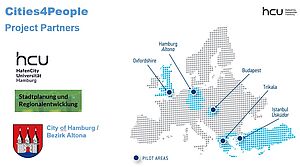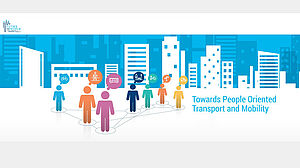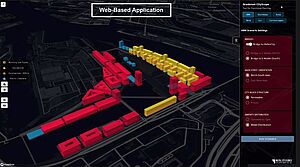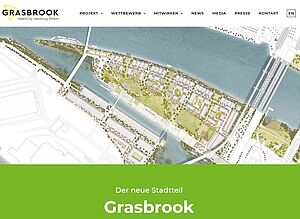Reshaping urban space and governance in Berlin
Grassroots Digital Urbanism: Reshaping urban space and governance in Berlin
At a time when the state-corporation version of the smart city seems to be far from a panacea for cities, there is a need to think beyond critiques of techno-capitalist developments and to imagine alternatives.
Among the recent urban experimental collectives and organisations, there is an increasingly strong aspiration to imagine new digital urbanism possibilities representing those who refuse to be excluded from the 'backend' of smart cities projects and avoid being kept 'dumb'.
AIM
The contribution of this research to provide insight on how these collectives are politically, spatially and performatively reappropriating the technological glitches in the city and enabling the (re)imagining alternative modes of digital urbanism in Berlin.
Approach
Telling observational and performative tales, this research follows multiple, creative, and careful practices of bottom-up collectives in Berlin. The collectives range from DYI internet infrastructure with autonomous data-hub (technological sovereignty), tech-feminist collectives (cyber feminist cities) to self-organised food deliveries (platform-cooperativism).
The research is also podcasting on its conceptual and empirical journey:
Digital Urbanism, from the Grassroots Podcast.
Funding Resource: German Research Foundation (DFG), Walter Benjamin Program
In Collaboration with: The Alexander von Humboldt Institute for Internet and Society (HIIG)
Project Duration: Sep 2022 – Oct 2024
Research Lead: Dr. Niloufar Vadiati
Project website: Niloufar Vadiati — GRASSROOTS DIGITAL URBANISM
![[Translate to Englisch:] COUP: Cockpit for Collaborative Urban Planning [Translate to Englisch:] COUP: Cockpit for Collaborative Urban Planning](/fileadmin/_processed_/c/7/csm_COUP_bdb2d9deee.jpg)
The Cockpit for Collaborative Urban Planning (COUP) is a toolbox for the rapid simulation of urban scenarios. It is composed of multiple plug-in modules that allow simultaneous examination of complex parameters such as noise pollution, wind speed, solar radiation, and pedestrian movement. The two user interfaces, a physical table and a web application improve participatory decision-making by enabling visualization and co-creation of urban settings.
Sponsor: HafenCity Hamburg GmbH
Partners: Austrian Institute of Technology (AIT) / MIT Media Lab
Project Duration: 2020 - 2022
![[Translate to Englisch:] MICADO: Migrant Integration Cockpits & Dashboards [Translate to Englisch:] MICADO: Migrant Integration Cockpits & Dashboards](/fileadmin/_processed_/d/a/csm_Micado_2_8c8e3a71ae.jpg)
![[Translate to Englisch:] MICADO: Migrant Integration Cockpits & Dashboards [Translate to Englisch:] MICADO: Migrant Integration Cockpits & Dashboards](/fileadmin/_processed_/9/a/csm_Micado-GlossaryforApp_1f068872f4.jpg)
MICADO is part of the EU research programme Horizon 2020, the consortium consisting of 15 partners is coordinated by the Digital City Science at the HCU Hamburg. By using new technologies of data analysis and data integration on the one hand and easily accessible audio-visual interfaces on the other, MICADO will provide a technical solution to facilitate the arrival and participation processes. These solutions will be developed and tested in co-creative processes in cooperation with the target groups of migrants and new citizens, public administrations, CSOs, and civil society. They aim at supporting communication with and between local authorities and facilitate access to relevant information.
Sponsor: Europäische Kommission Horizon 2020
Partners: MICADO Consortium
Project Duration: 01.01.2019 – 30.06.2022 - ongoing
![[Translate to Englisch:] TOSCA Toolkit [Translate to Englisch:] TOSCA Toolkit](/fileadmin/_processed_/2/5/csm_OpenCityToolkit_dce01bdb84.jpg)
![[Translate to Englisch:] TOSCA Toolkit [Translate to Englisch:] TOSCA Toolkit](/fileadmin/_processed_/8/4/csm_TOSCA_India-Week_508befd2d2.jpg)
The Toolkit for Open and Sustainable City planning Analysis is a cooperation with the Gesellschaft für Internationale Zusammenarbeit (GIZ) GmbH in India, Ecuador, and Palestine. Further partners are the municipal administrations, local tech companies, and universities across the different locations.
Sponsor: Deutsche Gesellschaft für Internationale Zusammenarbeit (GIZ) GmbH / Partners: Deutsche Gesellschaft für Internationale Zusammenarbeit (GIZ) GmbH, municipal administrations, local tech companies and universities
Project Duration: October 2019 – March 2021 - ongoing
The TOSCA Toolkit – Video Tutorial on Vimeo
![[Translate to Englisch:] SURE - Sustainable Development of Urban Regions [Translate to Englisch:] SURE - Sustainable Development of Urban Regions](/fileadmin/_processed_/0/1/csm_SURE_2_655de7c373.jpg)
![[Translate to Englisch:] SURE - Sustainable Development of Urban Regions [Translate to Englisch:] SURE - Sustainable Development of Urban Regions](/fileadmin/_processed_/5/1/csm_SURE-LOGO_fdacac0518.jpg)
SURE (F&SR) is a BMBF-funded, HCU-coordinated facilitation and synthesis research project carried out in cooperation with THL Lübeck and TÜV Rheinland Consulting. SURE F&SR operates a larger BMBF programme (nearly 150 institutions), in which 10 individual research and development projects focus on sustainable urbanism in South-East and East Asia, by supporting the projects in their scientific work, cross-sectional research, and finding cross-project synergies and transfer potentials.
Project Duration: 01.09.2020 – 30.08.2025
Sponsor: The Federal Ministry of Education and Research (BMBF) is funding this project within the framework of the Strategy „Research for Sustainability"
Partners: Technische Hochschule Lübeck, TÜV Rheinland Consulting
![[Translate to Englisch:] MEDIFLY Medizinischer Luftfrachtdienst [Translate to Englisch:] MEDIFLY Medizinischer Luftfrachtdienst](/fileadmin/_processed_/3/f/csm_MEDIFLY_a936d54f87.jpg)
![[Translate to Englisch:] MEDIFLY Medizinischer Luftfrachtdienst [Translate to Englisch:] MEDIFLY Medizinischer Luftfrachtdienst](/fileadmin/_processed_/e/b/csm_MEDIFLY_2_999930c5a2.jpg)
The Medifly Hamburg consortium project researches and develops how medical delivery services can be carried out safely in urban airspace using unmanned aerial vehicles. In addition to the legal and technical implementation, the focus is also on the support of the population, which is researched by the DCS through surveys and participatory formats.
Lead: GLVI Gesellschaft für Luftverkehrsinformatik
Projektlaufzeit: 2021-2022
![[Translate to Englisch:] i-LUM Innovative Luftmobilität [Translate to Englisch:] i-LUM Innovative Luftmobilität](/fileadmin/_processed_/4/c/csm_ILUM_03df3cd0a5.jpg)
![[Translate to Englisch:] i-LUM Innovative Luftmobilität [Translate to Englisch:] i-LUM Innovative Luftmobilität](/fileadmin/_processed_/0/3/csm_ilum22_9894a88d89.jpg)
The i-LUM joint project develops and evaluates the feasibility of innovative concepts and technologies for airborne urban mobility for the Hamburg Metropolitan Region in future scenarios (2040/2050). Within the project the DCS focuses on the planning, functioning, modeling and application scenarios of the ground-based infrastructure of the Vertiports.
Lead: Research Consortium of Hamburg Universities for Innovative Air Mobility in Hamburg
Coordinator: TU Hamburg, Prof. Gollnick
Project Duration: 2021-2023
![[Translate to Englisch:] MOVE 21](/fileadmin/_processed_/c/c/csm_MOVE21_b908af3095.jpg)
![[Translate to Englisch:] MOVE 21](/fileadmin/_processed_/c/8/csm_Move_21-_ff19b1fcf9.jpg)
![[Translate to Englisch:] MOVE 21](/fileadmin/_processed_/c/7/csm_Move21-Solve_a_Mobility_Challenge_6da8249577.jpg)
MOVE21 is an innovation project funded by the European Commission. It aims at transforming European cities and their surroundings into smart zero emissions nodes for mobility and logistics. The project helps participating cities achieve a 30% reduction of transport-related emissions by 2030 via the implementation of 15 transport-related innovations. The project coordinator is the City of Oslo – innovator city in C40 and European Green Capital in 2019. The cities involved are Oslo, Gothenburg, Hamburg, Munich, Rome and Bologna. HCU is participating to the project in several activities, and carrying out the lead of the work package focusing on “The Urban-Social Layer”. It is ensured a positive effect of the innovations deployed during the project at a social level.
EU Horizon 2020 project
Lead: City of Oslo
Project Duration: 2021-2024
In the context of urban air mobility, U-Space does not describe a specific area of airspace but rather is a framework for integrating drones into existing aviation, transportation, and environmental infrastructure. LUV is about the legal framework and acceptance strategy for Unmanned Airspace, particularly developing the concept of "U-Space" for access to lower airspace.
The official goal of the LUV project has been defined as “Solutions and recommendations for the national implementation of the U-Space Regulation”, but the part that DCS is working on is developing a strategy for integrating U-Space into the existing urban mobility setting, focusing on socio-political aspects. We used Hamburg as a case study to design a mechanism for stakeholders' participation and social acceptance of U-Space.
The project is funded by the Federal Ministry of Digital and Transport (BMDV) and runs from 01.01.2022 to 31.03.2023.
Direct partner:
Hamburg Authority of Economy and Innovation (BWI)
Other partners:
Universität der Bundeswehr Hamburg (HSU)
Deutsche Flugsicherung GmbH (DFS)
Droniq GmbH
HHLA Sky GmbH
Technische Universität Hamburg (TUH)
Project Duration: 01.01.2022 – 31.03.2023
The LIG project's second phase is focused on analyzing texts using Natural Language Processing (NLP) technique and focuses on two different data categories: Hamburg Parlament Database and Newsletters (MOPO and ZEIT). It is built on an automatic procedure to download data, clean the data (remove numbers, punctuation, and stop words) and analyze keywords, retrieve location names and further convert them into coordinates and visualize them on the LIG Finder by means of point clouds. In addition, it is done VADER sentiment analysis to get polarization information and further run LDA and STM (Structure Topic Modeling) to cluster topics within articles. It is also refactored LIG Finder web interface to make it more user-friendly, building Geoparser module, personalized feature, and data classification modules.
Partner: Landesbetrieb Immobilienmanagement und Grundvermögen (LIG) /State Agency for Real Estate Development Hamburg
Project Duration: August 2021 – December 2022
In the project ROMI Reallabor Open Model for Interdisciplinary Planning, a DFG proposal is being developed to establish the scientific basis for a (digital) model that enables effective and integrative inter- and transdisciplinary collaboration in planning processes in the built environment.
Lead: HCU Digital City Science
In cooperation with HCU Profs. Ballestrem, Bögle, Breckner, Mondino, Schiewe, Wildner
Project Duration: 2021-2023
DAFNE Platform Data Fusion Generator for AI is part of the BMBF program Generation of Synthetic Data for AI. Under the leadership of HAW Hamburg, a generator is being developed to produce large amounts of data needed for training AI algorithms in the Smart Cities use case that cannot be collected empirically. Digital City Science is leading the work package to develop and validate smart city use cases.
Lead: HAW Hamburg
Project duration: January 2021 - December 2023
Establishing experimental-explorative research and development projects, and creating new tools and methods for the visualization and analysis of urban data in the context of strategic land use and urban development.
Partner: Landesbetrieb Immobilienmanagement und Grundvermögen (LIG) /State Agency for Real Estate Development Hamburg
Project Duration: October 2019 – April 2021
Using methods and tools for digital urban research, the DCS develops an interactive city model for the district of Grasbrook in Hamburg. The model will be used to support planning and decision-making via the visualization of complex spatial and social contexts. It will simulate development scenarios based on important urban planning qualities such as mobility and accessibility, energy consumption, and air pollution.
Sponsor: HafenCity Hamburg GmbH
Project Duration: November 2018 - November 2020


![[Translate to Englisch:] Digitaler Graswurzel-Urbanismus [Translate to Englisch:] Digitaler Graswurzel-Urbanismus](/fileadmin/_processed_/2/1/csm_Grassroots_Digital_Urbanism_0c04cb26a5.jpg)
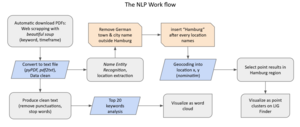
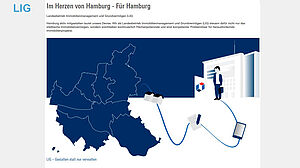
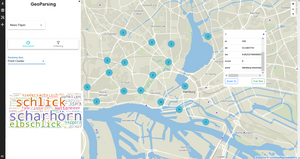
![[Translate to Englisch:] Sharing City College [Translate to Englisch:] Sharing City College](/fileadmin/_processed_/1/1/csm_Sharing_City_College_4f0ffd7e86.jpg)
